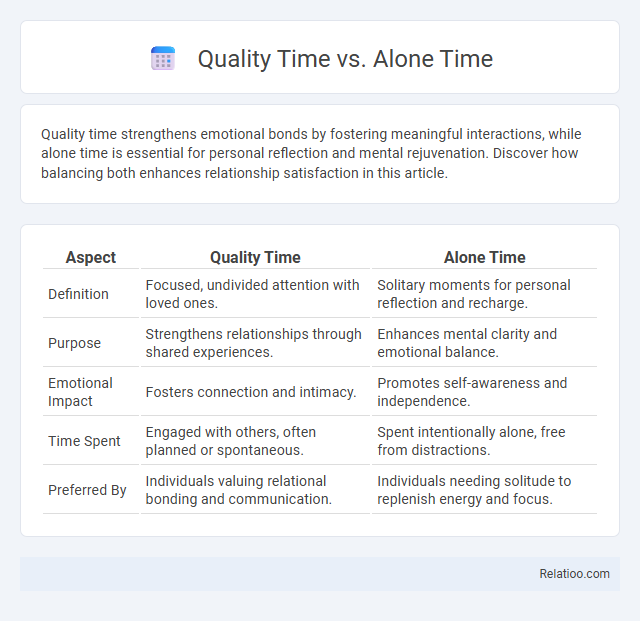Quality time strengthens emotional bonds by fostering meaningful interactions, while alone time is essential for personal reflection and mental rejuvenation. Discover how balancing both enhances relationship satisfaction in this article.
Table of Comparison
| Aspect | Quality Time | Alone Time |
|---|---|---|
| Definition | Focused, undivided attention with loved ones. | Solitary moments for personal reflection and recharge. |
| Purpose | Strengthens relationships through shared experiences. | Enhances mental clarity and emotional balance. |
| Emotional Impact | Fosters connection and intimacy. | Promotes self-awareness and independence. |
| Time Spent | Engaged with others, often planned or spontaneous. | Spent intentionally alone, free from distractions. |
| Preferred By | Individuals valuing relational bonding and communication. | Individuals needing solitude to replenish energy and focus. |
Understanding Quality Time and Alone Time
Quality time involves spending meaningful moments with loved ones, fostering connection and shared experiences that strengthen relationships. Alone time allows you to recharge, reflect, and cultivate self-awareness, providing essential mental clarity and emotional balance. Understanding the distinct benefits of quality time and alone time helps you manage your time effectively to nurture both personal growth and social bonds.
Key Differences Between Quality Time and Alone Time
Quality time involves intentional, focused interactions with others that strengthen relationships, emphasizing shared experiences and meaningful communication. Alone time, by contrast, centers on solitude for self-reflection, relaxation, or personal hobbies, promoting mental clarity and emotional recharge. Time, as a general concept, refers to the continuous progression of moments, while quality and alone time specify how those moments are purposefully allocated for social connection or individual well-being.
Benefits of Spending Quality Time with Others
Spending quality time with others enhances emotional connections, fosters trust, and promotes mental well-being by reducing feelings of loneliness and stress. Engaging in meaningful interactions strengthens social bonds, improves communication skills, and increases overall happiness. Your relationships thrive when you prioritize shared experiences over solitary moments, creating a supportive and fulfilling social environment.
The Importance of Alone Time for Mental Health
Alone time plays a crucial role in maintaining your mental health by providing an opportunity for self-reflection and stress reduction. Unlike quality time spent with others, which strengthens social bonds, alone time allows your mind to recharge and process emotions without external distractions. Prioritizing regular periods of solitude can enhance emotional resilience and overall well-being.
How to Balance Quality Time and Alone Time
Balancing quality time and alone time is essential for maintaining emotional well-being and nurturing relationships. You can achieve harmony by scheduling intentional moments with loved ones while reserving regular intervals for personal reflection and self-care. Prioritizing both ensures that your social connections remain strong without compromising your mental clarity and inner peace.
Signs You Need More Quality Time
Signs you need more quality time include feeling emotionally disconnected from loved ones, experiencing increased stress without meaningful support, and a noticeable decline in overall happiness despite having ample free hours. Quality time involves focused, undistracted interactions that strengthen relationships, unlike alone time, which centers on personal rejuvenation and reflection. Lack of quality time often leads to feelings of loneliness and frustration even when surrounded by people or spending plenty of time alone.
Recognizing the Need for Alone Time
Recognizing the need for alone time is essential for maintaining mental and emotional health, as it allows you to recharge and reflect without external distractions. Quality time, whether spent with loved ones or engaging in meaningful activities, complements alone time by fostering connections and personal growth. Balancing these aspects of time helps create a well-rounded and fulfilling lifestyle.
Quality Time Activities for Deeper Connections
Quality time activities such as engaging in meaningful conversations, shared hobbies, and focused attention foster deeper connections by prioritizing presence and emotional intimacy. Unlike alone time, which centers on self-reflection and personal rejuvenation, quality time actively builds relationships through intentional interaction. Balancing both alongside routine time management enhances overall well-being and strengthens interpersonal bonds.
Tips for Maximizing Your Alone Time
Maximizing alone time involves setting clear boundaries to create undisturbed periods dedicated to personal reflection and relaxation. Prioritize activities that rejuvenate your mind and body, such as reading, meditation, or creative hobbies, which enhance mental clarity and emotional well-being. Utilize digital detox strategies by limiting screen usage to deepen focus and foster a stronger connection with your inner self during solitude.
Finding the Right Balance for Personal Well-being
Balancing quality time, alone time, and personal time is essential for maintaining your well-being and emotional health. Quality time with loved ones fosters connection and support, while alone time allows for reflection, relaxation, and self-discovery. Finding the right balance between social interactions and solitude helps improve mental clarity, reduce stress, and enhance overall life satisfaction.

Infographic: Quality Time vs Alone Time
 relatioo.com
relatioo.com